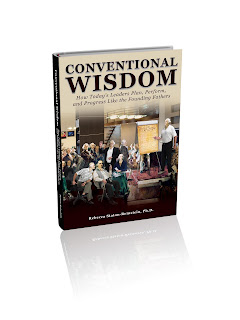
It seemed like an insignificant thing at the time. Jim, the CEO of a Midwestern printing company, decided to start drinking bottled water. He made no pronouncement and asked no one else to do the same. Six months later, every manager and supervisor was drinking bottled water and bottled water dispensers had been installed throughout the plant and offices.
What happened? It's a phenomenon known as 'Shadow of the Leader.' Put very simply, people unconsciously begin to act like, and even think like, the leader of the group. For many it is completely unconscious. The leader doesn't force it to happen (unless of course you're dealing with a dictator or megalomaniac or other negative leader.) But great leaders set out consciously to create an enduring culture.
The Shadow has great consequences for the organization. I've been looking at how this plays out in the way things get organized and then get done for almost 40 years. Back in the 1970s a new take on leadership and corporate culture started to emerge. This Shadow of the Leader concept was first studied in depth by Larry Senn in his 1970 dissertation. My own dissertation explored the same phenomenon in a grassroots, community organization. Later as a corporate officer, I went through training by the Senn Delaney company on applying Senn's insights. The idea had come full circle with me.
In my new book, I was back on the same quest -- not to look for trivial examples like drinking bottled water but to find examples that would be useful for every leader in today's new tough reality. Perhaps one of the best examples from the history I explored was George Washington.
Washington was not always an iconic leader. His early military career did not look too promising. But he had a characteristic that ultimately propelled him to the top. He determined to mold his own character into someone he and others could admire. So when he was appointed to head the Continental Army and wrest the country from the British empire, he was ready. He turned a rag tag bunch of farmers, merchants, and ne'er-do-wells into a disciplined fighting force.
But it was his peace-time leadership that illustrates the Shadow concept best. First, at the Constitutional Convention he was immediately and unanimously elected to serve as president of that historic session. Delegates watched his body language closely to see which ideas he favored. Although he never took part in the public debates, his views were well known and held great sway with the delegates. On the last day, when he finally spoke and suggested changing the number of voters for each congressional district, the assembly passed it without discussion.
There was never a doubt about who the first elected president of the Republic would be. In fact, there were a significant number of leaders who believed that he should be an elected king. But Washington was a believer in the republican cause of representative government and refused to turn his office into a throne. He understood his Shadow and thought long and hard about every decision from the most trivial to the most profound -- he knew history was watching.
When he stepped down after two terms, he established a precedent that held until the Roosevelt administration and was then codified in the 22nd amendment to the Constitution.
Washington cast a long Shadow of leadership that established a dignity about the office of the president. (Now lest you continue to see him as the stiff figure in paintings and statues, remember that he was a renowned dancer and enjoyed partnering the ladies in the most intricate and spirited dances of the day.)
Perhaps the most enduring part of his Shadow for leaders to be aware of today was his courage in the face of every danger -- not just in war. As the country was collapsing in 1787, he stepped forward to take part in the Constitutional Convention -- which gave it legitimacy and ensured others would join in. When he took on the presidency of the new republic, he had to invent it and reached out to trusted leaders for advice and counsel -- Alexander Hamilton, James Madison, Thomas Jefferson. He was willing to face the crises of his day -- foreclosures, inflation, civil unrest, foreign threats, falling credit, piracy, and more. He was willing to invent a new form of government to save the country.
Leaders can learn a lot from walking in Washington's Shadow -- there's a lot of light there.
(c) Rebecca Staton-Reinstein, President, Advantage Leadership, Inc.
Author: Conventional Wisdom: How Today's Leaders Plan, Perform, and Progress Like the Founding Fathers www.ConventionalWisdomCenter.com





